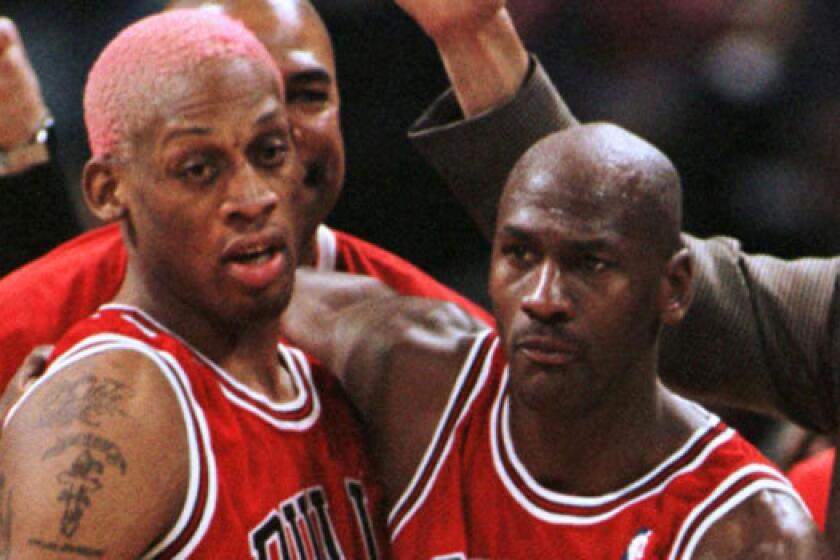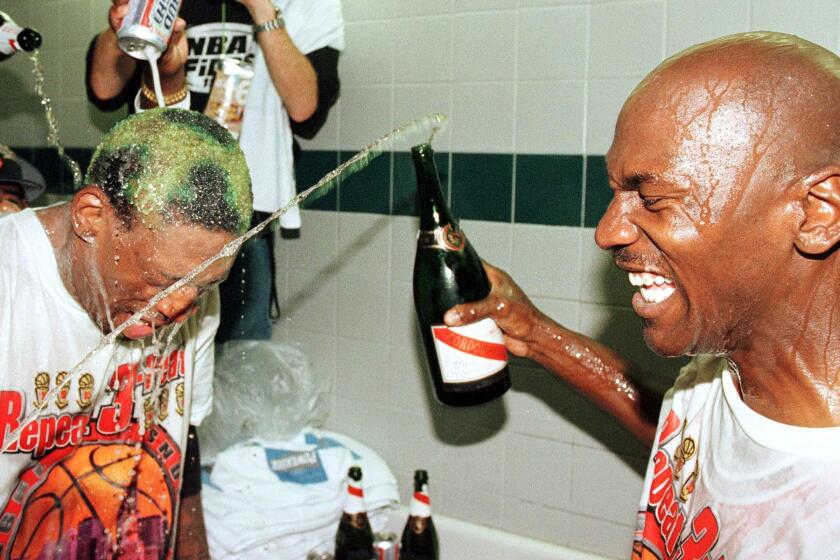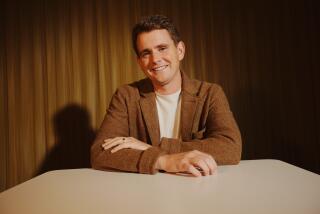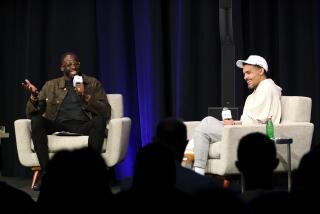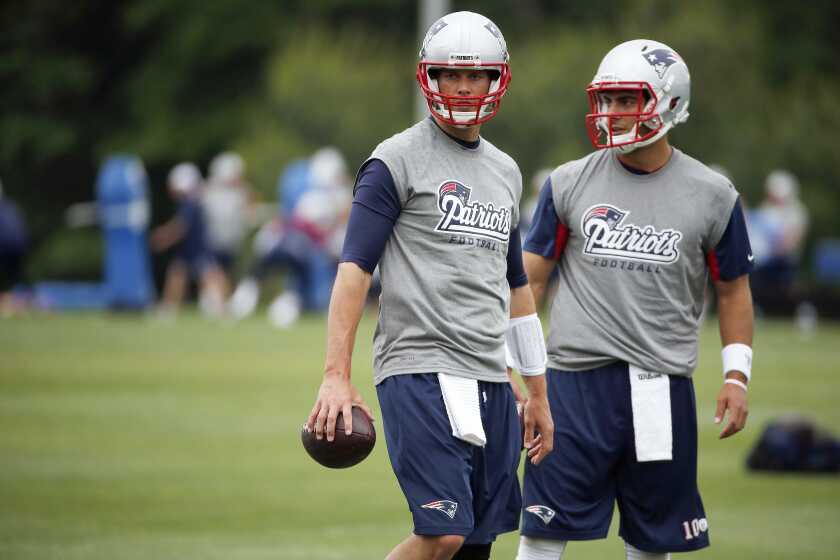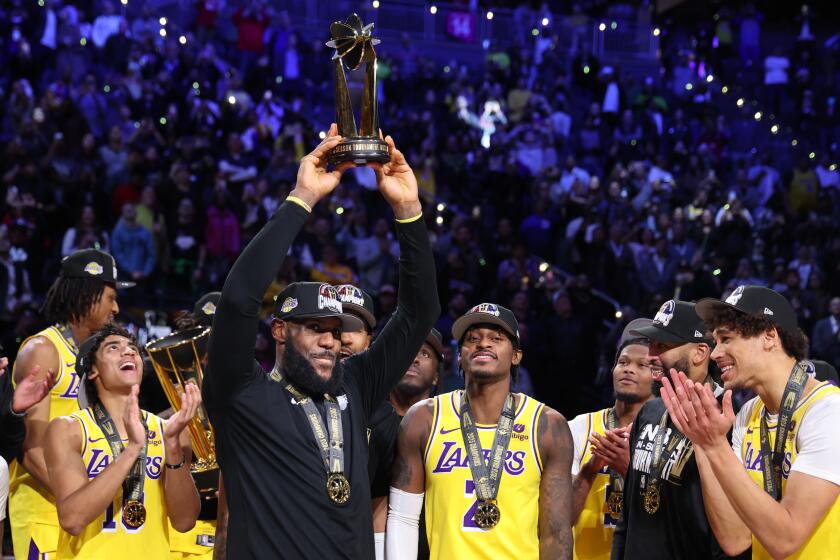Column: ESPN’s ‘The Last Dance’ docuseries was an unfinished symphony until just recently
It was a week after the COVID-19 pandemic prompted Los Angeles County to issue a stay-at-home order, and several days after the NBA had suspended its season indefinitely.
LeBron James, on the “Road Trippin’” podcast said what many fans were already thinking about “The Last Dance,” the 10-part documentary on Michael Jordan and the Chicago Bulls that was scheduled to air in June.
“I’m telling you, if they released that thing right now, the views on that?” James said. “If I’m Michael Jordan, I’m going in there and I’m making a conference call and I’m like, ‘OK, what’s the reason we’re going to hold onto it until June?’ Compared to now, when everybody is at home, because it’s done.” He added again, for emphasis, referring to the documentary, “It’s done.”
The comments ignited a firestorm on social media, fans demanding the film be released. What those people didn’t know was that there had already been several conference calls about moving up the premiere date.
There was one big problem: It wasn’t done. Not even close.
Director Jason Hehir had been scheduled to travel to Spokane, Wash., to shoot the final interview for the project — with former Utah Jazz star John Stockton — on March 10. But ESPN called him off the trip, fearing that airline flights might be canceled and he would be stranded.
The second installment of ESPN’s Michael Jordan documentary series tells the story of the birth of the Chicago Bulls’ dynasty and its two star rebels.
“We didn’t know what shelter in place even meant at that point,” Hehir said recently. “We would not have been able to finish if I was stuck in Spokane for an extended period of time.”
The day after he was supposed to meet with Stockton, March 11, the NBA suspended its season.
Around the same time, producer Mike Tollin was in New York visiting his recently married daughter. From there, he was scheduled to fly back to Atlanta where he was shooting a sequel to “Varsity Blues.”
“I got a call basically telling me, ‘Don’t bother coming back, we’ll ship your stuff to L.A.’ and I flew back home,” said Tollin, co-chairman of Mandalay Sports Media. “That Friday the 13th was when the world stopped spinning and by Monday morning I was on a conference call with ESPN, Netflix, Jump Inc., NBA and Mandalay Sports Media and … we started looking at the calendar and it was up to Jason to look at the amount of work that still needed to be completed and back time it from there.”
Hehir was already stressed about finishing the documentary in time for the original air date. The first three episodes were complete and seven of the 10 episodes were in various levels of post-production when all non-essential business in New York was shut down on March 16. Hehir and his team of five editors had already been working from their New York apartments because two employees at their editing facility had tested positive for COVID-19. The final touches would now come from five different apartments, with editors scheduling Zoom meetings and uploading videos onto Vimeo.
The original plan for “The Last Dance” was for it to premiere June 2, two days before Game 1 of the NBA Finals. Two episodes at a time would be broadcast between Finals games, finishing up after Game 4.
“It was basically going to fill the gap between games,” said Peter Guber, chairman of Mandalay Sports Media and co-owner of the Golden State Warriors, Dodgers and LAFC. “The idea was to keep the momentum of the games alive.”
Hehir believed he could finish the final episode by mid-May, so airing one episode per week for 10 weeks was discussed before the decision was made to premiere on April 19 and close on May 17, with two episodes airing every Sunday.
Contrary to the usual practice of having an entire series complete before it debuts, work on episode 9 was finished Friday and the final is scheduled to be done by May 10, as viewers watch episodes 7 and 8.

No doubt, it was worth the trouble. With most sporting events around the world suspended, “The Last Dance” is being subtitled, translated, dubbed and distributed on Netflix to more than 190 countries outside the United States and is being analyzed and talked about as if it were an NBA playoff series rather than than a docuseries. The first four episodes are the four most-viewed original broadcasts on ESPN since 2004 with an average of 6 million viewers.
“You always want to try and find an open window to get the most attention and you’d have to dead, blind or stupid not to realize there was a tremendous vacancy in the marketplace,” Guber said. “It has created the kind of firestorm you hope to have in your film-making career at least once. It becomes larger than the film. It becomes a cultural experience.”
‘The Last Dance,’ which debuts Sunday, might shock some fans with its unfiltered behind-the-scenes look at Michael Jordan and the Chicago Bulls.
Guber added that he wished the series had been rolled out as originally planned, and the pandemic had never happened. He and Tollin often use the word “bashert,” a Yiddish word meaning “destiny,” to describe how the documentary came together after Jordan originally agreed to it four years ago.
“You have to believe in bashert because so many things have to happen and so many things have to not happen to get to this point,” Tollin said. “In the end, everything fell into place when it was supposed to.”
More to Read
Go beyond the scoreboard
Get the latest on L.A.'s teams in the daily Sports Report newsletter.
You may occasionally receive promotional content from the Los Angeles Times.
